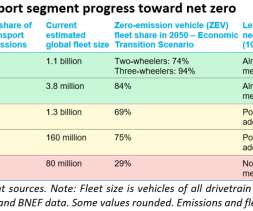New report finds global CO2 vehicle emission reduction measures falter; dropping diesels, increasing SUVs
Green Car Congress
MARCH 21, 2019
Vehicle fuel economy improvements have slowed globally, according to the latest report from the Global Fuel Economy Initiative (GFEI): Fuel Economy In Major Car Markets: Technology And Policy Drivers 2005-2017. Overall, global fuel economy has improved by an average of 1.7%












































Let's personalize your content